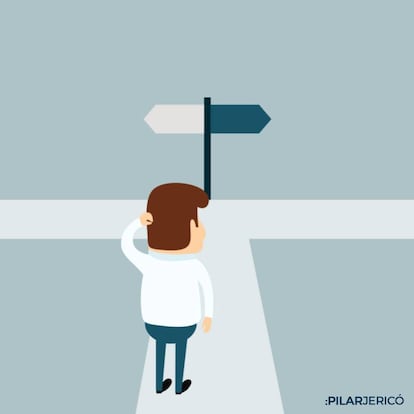The secret to making good decisions
The golden 10-10-10 rule helps us to put aside our doubts
Should I go study something I’m interested in or accept a job offer? Break up with my partner or work our problems out? Get a dog or a cat? A new bike or save for a holiday? Living is about decisions, and decisions mean losing out on one thing or another, which is why they are so hard to make.

We panic because we are faced with various alternatives and we don’t know which is best for us. Perhaps we want everything or perhaps nothing appeals at all. We are assailed by doubt and act on impulse and then we look back and are filled with regret.
The answer to good decision-making is to get things in perspective. When we are paralyzed by doubt, it is usually because we are failing to take a realistic look at the future impact of our actions. This is where the 10-10-10 rule comes in.
Will I feel bad about the decision I take in the next 10 minutes?
The 10-10-10 technique is the brainchild of Suzy Welch, former editor of the Harvard Business Review. It is a self-help approach to short-term, medium-term and long-term decisions that Welch devised after years of juggling a successful career with parenting four children.
Welch’s experience led her to the conclusion that we have to take the short-, medium- and long-term into account to make a decision we won’t regret. If we focus too much on the medium-term, we might forget the immediate effect of our decision. Likewise, focusing on the now might make us too impulsive. For example, should I get to this social event or stay at home and enjoy some peace and quiet with my family? We might make the wrong decision if we base it on feeling a responsibility to be superwoman and being everywhere at the same time without considering that peace is what we need at that moment.
To get the 10-10-10 effect, we need to ask ourselves: will I feel bad about the decision I take in the next 10 minutes? Will I feel bad in the next 10 months? Will I even remember this in 10 years’ time?
That way we can work out its impact. If we take a look at things that made us panic in the past, such as certain exams or talking in public, or a party where we knew no one, we realize little matters as much as we think it does. Our minds tend to exaggerate when faced with problems and we make better decisions when we get our perspective back.
Using the 10-10-10 rule is a good way of looking at time in 3-D so that it works in your favor and not against you!
English version by Heather Galloway.
Tu suscripción se está usando en otro dispositivo
¿Quieres añadir otro usuario a tu suscripción?
Si continúas leyendo en este dispositivo, no se podrá leer en el otro.
FlechaTu suscripción se está usando en otro dispositivo y solo puedes acceder a EL PAÍS desde un dispositivo a la vez.
Si quieres compartir tu cuenta, cambia tu suscripción a la modalidad Premium, así podrás añadir otro usuario. Cada uno accederá con su propia cuenta de email, lo que os permitirá personalizar vuestra experiencia en EL PAÍS.
¿Tienes una suscripción de empresa? Accede aquí para contratar más cuentas.
En el caso de no saber quién está usando tu cuenta, te recomendamos cambiar tu contraseña aquí.
Si decides continuar compartiendo tu cuenta, este mensaje se mostrará en tu dispositivo y en el de la otra persona que está usando tu cuenta de forma indefinida, afectando a tu experiencia de lectura. Puedes consultar aquí los términos y condiciones de la suscripción digital.








































